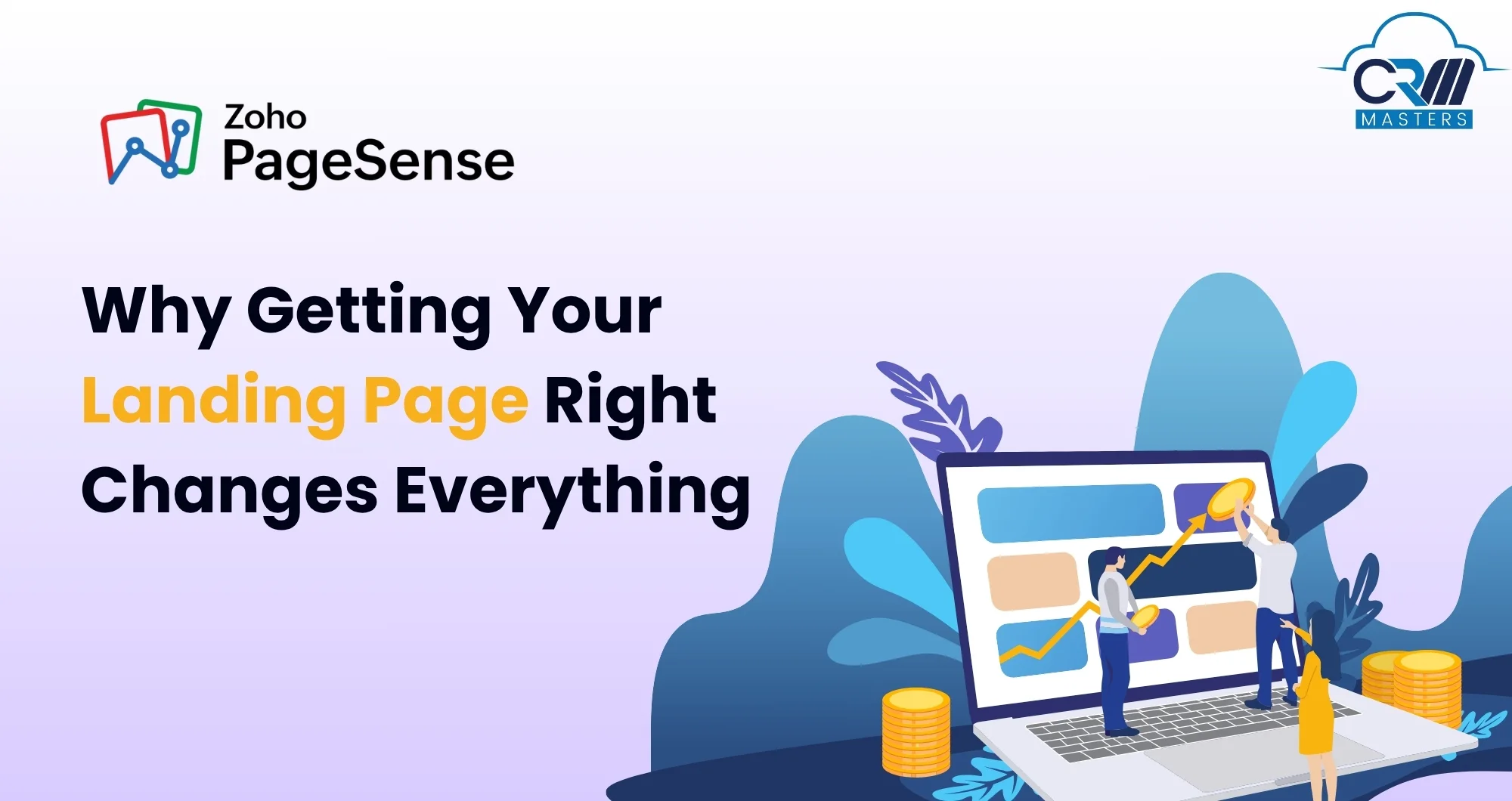
Why Getting Your Landing Page Right Changes Everything
Imagine spending money on ads, email campaigns, or social media promotions, and then losing the visitor on the Landing Page in just 3 seconds. Yes, it happens more often than most businesses realise.
A landing page is not just another webpage. It’s the first impression, the decision-maker, and sometimes the only chance to convert a visitor into a lead or customer. A poorly designed landing page can drain your marketing budget, while an optimized one can boost conversions by 50%–160%. And this is exactly where Zoho PageSense becomes the game-changer.
Zoho PageSense helps you test, analyze, and optimise every element of your landing page, so instead of guessing, you make decisions backed by real visitor behaviour. But before we get into PageSense, let’s explore why landing pages matter so much, and what optimization really looks like.
Why Landing Pages Matter More Than You Think

Because of these mistakes, most landing pages convert at less than 6%. But with structured optimization, smart testing, and behaviour analysis, a landing page can turn into a converting machine.
Let’s break down the 10 landing page optimization best practices, expanded, deeper, and more actionable.
A landing page is designed for one purpose:
- Generate leads
- Get signups
- Sell a product
- Drive downloads
- Collect inquiries
However, most businesses make common mistakes, such as:
- Adding too much information
- Using weak CTAs
- Not matching ad intent
- Ignoring mobile responsiveness
- Not testing what works
- Creating cluttered layouts
- Having a slow page loading speed
10 Best Practices for Landing Page Optimization
1. Limit the Number of CTAs
One of the biggest reasons visitors don’t convert is confusion. If you ask them to “Book a Demo”, “Download the Guide”, “Subscribe”, and “Contact Us” on the same landing page, you’re basically giving them reasons NOT to take action.
Why fewer CTAs work better:
- Visitors don’t get decision fatigue
- Focus stays on the primary action
- Page looks clean and professional
- User journey becomes predictable
How to improve this section on your landing page:
- Use one primary CTA (“Get Started”, “Book Free Demo”)
- Use bold, contrasting colours
- Keep the text short and action-driven
- Reduce unnecessary sections competing for attention
2. Highlight Your Value Proposition Faster & More Prominently
Your landing page has 0–5 seconds to make an impression. If the user cannot instantly understand “WHAT you offer” and “WHY it matters,” they leave.
What a strong value proposition should do:
- Speak directly to the visitor’s need
- Provide clarity in 1–2 lines
- Focus on benefits, not features
- Match the visitor’s intention
3. Match Visitor Intent
If someone clicks an ad that says “Free SEO Audit”, but your landing page talks about monthly SEO packages, they instantly disconnect.
How to match intent correctly:
- Ensure ad headline matches landing page headline
- Maintain the same tone and promise made in the ad
- Avoid adding unrelated offers
- Keep the flow consistent from ad → landing page → CTA
Why intent matters:
- Reduces bounce rate
- Builds trust
- Removes confusion
- Improves conversion probability significantly
4. Minimize Information Overload
Users don’t want to “work” to understand your page. Too many text blocks, too many images, too many options, all create confusion. Think of your landing page as a guided path, not a catalogue.
Best ways to minimise overload:
- Use short, digestible sections
- Use bullet points instead of long paragraphs
- Remove unnecessary product descriptions
- Avoid showing too many pricing options
- Use whitespace effectively
5. Reduce Page Load Time
Slow landing pages = lost leads. Visitors expect websites to load in under 3 seconds. Anything beyond that increases bounce rates dramatically. A one-second delay can reduce conversions by 20–30%.
Ways to speed up landing page loading time:
- Compress images
- Avoid heavy scripts and ads
- Enable browser caching
- Remove unused plugins
- Use modern web hosting
- Minimize redirects
Why it matters:
- Fast pages improve user experience
- Improves mobile conversions
- Helps with SEO rankings
6. Address Buyer Fear
Users hesitate to share personal information or card details unless they feel safe.
Eliminate fear by adding:
- A short line under form fields (e.g., “We never spam”)
- Clear message for free trials (“No auto-charges”)
- Information on data privacy
- Secure badge icons
- Customer support phone number
Addressing user hesitation early increases trust and leads directly to more conversions.
7. Use Exit-Intent Pop-Ups
Exit-intent technology tracks when a user is about to close the page. This is the perfect moment to give one last nudge.
Effective exit-intent pop-ups can offer:
- A limited-time discount
- A free eBook
- Early access to something
- A reminder of benefits
- A countdown timer
- A lead magnet (“Get our free guide!”)
These pop-ups often recover 10–20% of abandoned visitors.
8. Optimize Form Fields
Forms are the heart of landing pages. The shorter the form, the higher the conversion rate. Simpler Forms = More Conversions
Tips for high-converting forms:
- Keep only necessary fields
- Use field labels clearly
- Use autofill wherever possible
- Show progress indicators for longer forms
- Add validation messages
Example:
A 10-field form may convert at 3–5%, while a 3-field form may convert at 10–15%. Forms should feel easy, not exhausting.
9. Add Trust Signals
People trust brands that others trust. Even adding a simple phone number increases signups significantly.
Types of trust signals to include:
- Customer testimonials
- Case studies
- Video testimonials
- Security badges
- Industry certifications
- Social proof (logos of companies that trust you)
- Star ratings
- Influencer mentions
10. Experiment Continuously
A/B testing is the secret weapon of high-converting landing pages. Testing removes assumptions and replaces them with real insights.
Elements to test:
- Headlines
- CTAs
- Button colours
- Page layout
- Images
- Form fields
- Social proof placement
- Hero section layout
How Zoho PageSense Helps You Build High-Converting Landing Pages

Zoho PageSense is one of the most powerful CRO tools available, especially for small to mid-sized businesses. What makes PageSense special is that it brings all essential optimization tools into one platform.
Below is an expanded breakdown of how PageSense improves landing pages:
- Build and Manage Personalised User Experiences
- PageSense allows you to tailor content based on:
- Visitor location
- Device used
- Traffic source
- Time of visit
- Behaviour on site
- Interaction with specific elements
- Visitor segments (new, returning, high-intent, etc.)
Example:
A visitor from Delhi browsing at night may see a “Chat with Us” prompt,
while a US visitor in the morning might see “Book a Demo”.
This creates hyper-personalised experiences that increase conversions dramatically.
2.Track Goals That Actually Matter
Instead of vague assumptions, you get precise conversion data on what users actually do.
You can set measurable goals such as:
- Button clicks
- Form submissions
- Video plays
- Scroll depth
- Add-to-cart actions
- Page engagement metrics
3. Run A/B Tests with Zero Technical Effort
The interface is DIY, flicker-free, and requires no coding, meaning faster and smoother testing. PageSense allows non-technical teams to run experiments easily.
What you can test:
- Variation of your landing page
- CTA wording
- Visual changes
- Pricing layouts
- Headlines
- Banner images
- Form layouts
4. Behaviour Analytics
This is the goldmine of PageSense.
Heatmaps show:
- Where users click
- What they ignore
- Where attention is highest
- How far users scroll
Session recordings show:
- Every movement of the visitor
- Where they hesitate
- Where they get stuck
Funnels show:
- Where users drop off
- Which stage needs improvement
These insights help you understand your audience better than any survey ever could.
Conclusion
Landing pages are one of the most powerful assets in your marketing strategy. If created and optimized correctly, they have the power to dramatically increase leads, sales, and customer engagement. With Zoho PageSense, businesses don’t have to rely on guesswork, they get accurate data, real-time insights, and intelligent tools to build high-performing landing pages.
If you want to implement Zoho PageSense, run effective A/B tests, or get your landing pages optimized professionally, CRM Masters, as a Zoho Partner, is here to help.
We help businesses create meaningful digital experiences with Zoho, from setup to integration to CRO optimization.
Want high-converting landing pages? Let CRM Masters handle it for you.
FAQ
Q1. Why is landing page optimization important?
Ans. Optimized landing pages improve user experience, reduce bounce rates, deliver clarity, and significantly increase conversions.
Q2. Can PageSense help if I have low website traffic?
Ans. Yes. PageSense provides behaviour insights and micro-conversion tracking, which help you optimize even with fewer visitors.
Q3. How can CRM Masters help with PageSense?
Ans. CRM Masters helps businesses implement, configure, personalize, and optimize Zoho PageSense to ensure maximum conversions and smooth performance.












